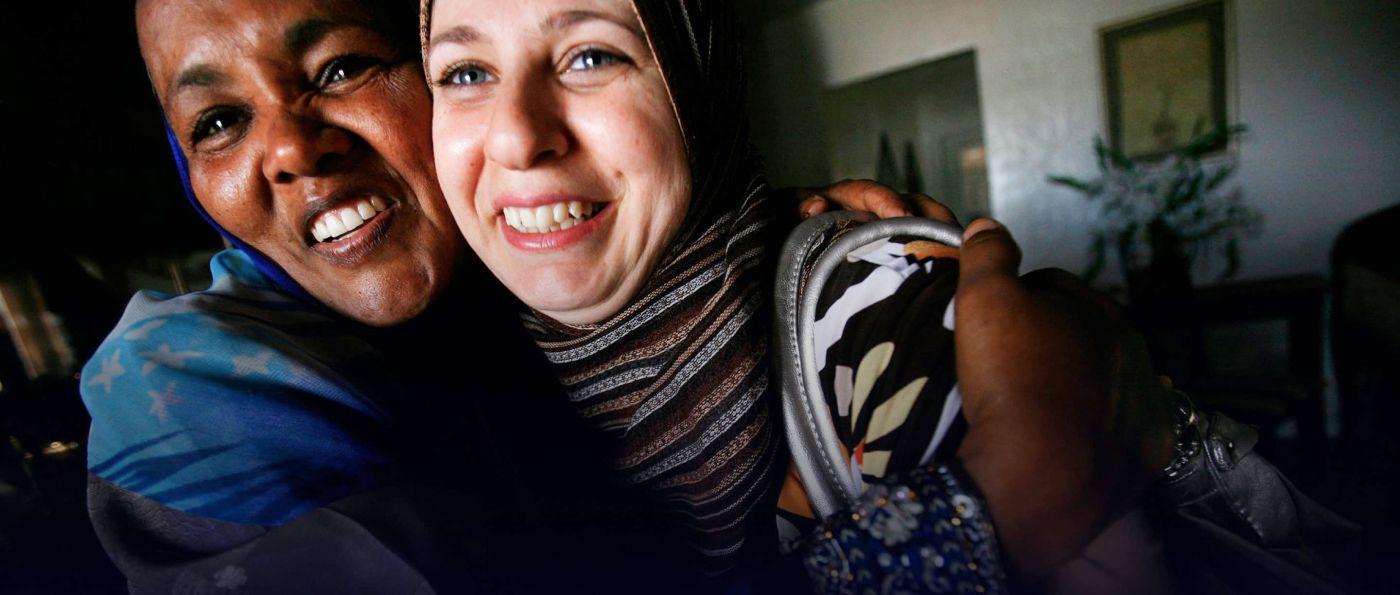Welcome Tables: A hosting guide

Welcome Tables bring people together to build bridges, create understanding, and inspire community-driven action. By inviting neighbors and community members to your table, you can expand the Welcomer community by sharing stories, learning about newcomers’ journeys, and exploring ways to support private sponsorship.
This Welcome.US guide equips you with practical tips for hosting your Welcome Table, including a discussion guide, educational resources, and next steps for participants. Thank you for extending your table to share the transformative impact of welcoming and how it strengthens communities.
Why host a Welcome Table?
Americans in all 50 states and more than 12,000 zip codes have welcomed newcomers to their communities and helped them build new lives in safety. While the U.S. government has recently paused or ended private sponsorship programs, Americans continue to support newcomers already in their communities and champion safe, legal, and orderly newcomer pathways. For this reason, Welcome Tables aims to:
- Build community connections: Grow your network of community members who care about the work of welcoming.
- Foster awareness and understanding: Share personal stories or watch educational materials together to understand the newcomer experience and how welcoming strengthens our communities.
- Take action together: Inspire your network to take action to support newcomers and private sponsorship programs.
Anyone can host a Welcome Table
A Welcome Table is a gathering where people can come together to share a meal, stories, and conversation. Whether you’re new to welcoming or are already involved, everyone has a seat at this table. This is a highly flexible format centered on community and connection, and we encourage you to use this guide to help organize your own gathering.
Planning your Welcome Table
Invite your guests
Planning for 5 to 15 guests is ideal for a gathering with thoughtful discussion. When creating your invite list, think about including the following:
- Neighbors who have expressed curiosity about supporting refugees
- Friends involved in other volunteer or civic service activities
- Members of local faith, civic, or community organizations
- Leaders in the community
- Sponsors or those who are interested in sponsoring newcomers
- Newcomers in your community who are interested in sharing their story
Choose your venue
You may decide to host your Welcome Table in your home, but other options include:
- A public space, such as a park, reservable library room, or community center
- A place of worship
- The home of a community member
- A refugee or immigrant-owned restaurant
Set the agenda
Your Welcome Table agenda might include:
- Welcome and introductions
- Sharing the purpose of your gathering
- A “main course” film, book, personal testimony, or educational content along with a meal or snacks
- Guided discussion inspired by the conversation tips and questions below
- Next steps that everyone can take
Plan the "main course"
Consider planning your Welcome Table around a testimony, short film, documentary, or book to help spark meaningful conversation.
Personal testimonies:
- Share your experience of private sponsorship, welcoming a newcomer, or even immigrating yourself. Whether you’re a sponsor, a Welcomer, or still learning about sponsorship, your story is meaningful and can impact others.
- Invite other speakers, such as a sponsor or newcomer, who can share their experience.
- Arrange for a representative from a local organization serving refugees to talk about their work.
- Share your family’s generational history of how they came to America, and ask participants about their history.
- Check out a few testimonials from sponsors on our website.
Short-form videos (30 minutes or less):
- "One Good Reason" is a brief documentary exploring motivations for sponsorship.
- “Communities in America come together” is a short Welcome.US video showcasing the collaborative efforts of Welcomers.
- “America is a nation of Welcomers” is a short Welcome.US video that highlights America’s history of welcoming newcomers.
Longer documentaries (consider showing excerpts):
- "Human Flow" (2017) is a documentary about the global refugee crisis.
- “Simple as Water” (2021) follows five Syrian families on their harrowing journey fleeing their homeland in search of safety.
- "Midnight Traveler" (2019) follows an Afghan family's journey captured on smartphones.
- “God Grew Tired of Us” (2006) is the story of Sudanese refugees navigating the challenges of resettlement in the U.S. after fleeing their war-torn homeland.
Books:
- "The Ungrateful Refugee" is a personal memoir by Dina Nayeri, telling her story of fleeing Iran as a child.
- “We are Displaced: My Journey and Stories from Refugee Girls Around the World” by Malala Yousafzai.
- For more suggestions, see Wecome.US’ list of 5 books by refugee authors.
Educational resources:
- Visit Welcome.US’s guide to supporting sponsorship, which includes talking points on private sponsorship.
- Join a “Welcome.US at the Table” webinar or watch previous sessions on-demand.
Consider a meal
Food brings us together. If you choose to include a meal in your gathering, check out our recipe collection, which includes Ukrainian borscht and Afghan dumplings. If you are planning to eat out, consider a restaurant that newcomers founded.
Preparing for a meaningful conversation
As you facilitate a Welcome Table, it’s helpful to approach conversations with an awareness of diverse beliefs, backgrounds, and experiences. Talking about sponsorship and other immigration topics may feel daunting, and knowing where to start can be challenging.
1. Start with openness
a. Try: Setting a goal to engage and connect, not to argue and win.
b. Avoid: “You don’t understand” or “You are misinformed on immigration…”
2. Embrace different viewpoints
a. Try: Speaking with an “also/and” perspective.
b. Avoid: Conversations with an “either/or” approach.
3. Use language that emphasizes our shared humanity
a. Try: “We all deserve safety and security.”
b. Avoid: “We need to help them.”
4. Listen to learn
a. Try: “Tell me a little more about why you feel that way.”
b. Avoid: Assuming someone is “less moral” because they may disagree with you.
5. Share stories and personal experience
a. Try: “Refugee families sacrifice for stability. Once welcomed, they rebuild their lives and give back.”
b. Avoid: “Statistics show that thousands of refugees need our help.”
Discussion questions to consider
1. General
a. What is the significance of the meal you’re serving?
b. What does welcoming mean to you?
c. What experiences do you have with newcomers in your community? Have you ever sponsored a newcomer?
d. How do newcomers strengthen your community?
2. "Main course" discussion questions
a. What did you learn that you didn't know before?
b. What resonated with you most personally and why?
c. Did anything surprise you?
d. Which stories or examples stood out to you, and why?
e. How does this content connect to your own experiences?
f. How does what we watched/read/discussed relate to our local community?
3. Action oriented questions
a. What challenges exist for the newcomers in our community right now?
b. What resources exist that we could tap into, and what skills do we have to help newcomers?
c. Who else in our community should be part of this conversation?
d. What can we do now to support newcomers and sponsorship programs?
e. What's one small step each of us could take this week?
Continuing our work of welcoming
End your Welcome Table by inviting participants to take the next steps. We encourage your group to brainstorm ways you can take action locally, such as volunteering or fundraising to support newcomers already in your community.
Learn more and get involved
- Contact your federal representatives in support of private sponsorship.
- Consult our Guide to Supporting Sponsorship for 5, 10, and 15-minute ideas for taking action.
- Find volunteer opportunities near you.
- Donate to help newcomers and sponsors through Welcome.US or other local organizations.
- Stay connected by joining our email list and following us on social media (Instagram, Facebook, and YouTube).
- Share what you’ve learned with others in your community by facilitating more conversations about sponsorship.
Thank you for hosting
We’re grateful for the time, energy, and heart you put into creating a space for connection and conversation. Your Welcome Table gathering is part of a nationwide movement based on our shared value of welcome.
Please share your experience with us! We’d love to hear from you via this short feedback form. Learning about your experience will help us celebrate the impact of Welcome Tables across the country and tell the good story of Welcomers like you.




